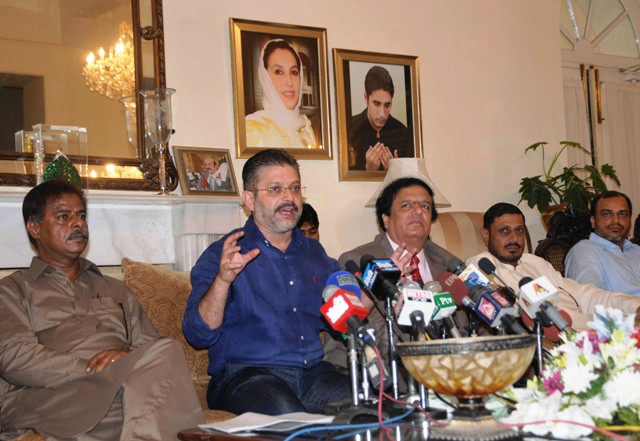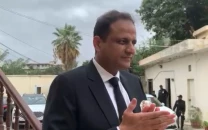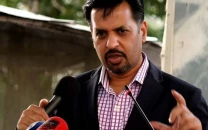PPP starts defending new local body system
Ordinance needs to be voted into law in 90 days by the Sindh Assembly.

A day after it issued the new local government ordinance on how towns and cities in Sindh will be managed, the ruling party’s ministers began their battle to defend it.
The first items that Information Minister Sharjeel Inam Memon tackled were revenue and police, the two linchpins of a government. “We again want to clarify here that the revenue and police departments will continue under the provincial government,” he said. These departments are purely a provincial government matter and cannot be controlled by a mayor, he said at a press conference at Chief Minister House Saturday. The chief minister will be the final authority on the land utilization department and without his approval not a single inch of land can be allotted to anyone.
Cold coalition
The PPP, MQM, ANP, PML-Q, PML-F and NPP form the Sindh government. The coalition is in trouble, however, as the MQM and PPP’s partners have tendered their resignations and declared that they are supporting a strike on September 13.
“Some ‘tonga’ parties have started propaganda without reading the ordinance,” he said, referring to politicians who held no elected power in the set-up. “We will not negotiate with them, but we will address the grievances of our coalition partners.”
If Memon expected any debate on the Sindh Peoples Local Government Ordinance, 2012 he could have hardly expected it by Saturday. Copies of the ordinance were hard to come by until the evening. A schedule was made available but it provided an incomplete picture of the 293-page document.
Memon tried to sweet-talk his way past this. “This document, consisting of 280 pages, is not sacred so that it cannot be amended,” he said, waving a copy. “It has around 179 sections. We will move it in the Sindh Assembly within 90 days to have it passed and make amendments.”
He called it a model system prepared by the two major parties. “Not just us but other coalition partners have also given input for this law, which aims to devolve powers to the grass-roots level, which is a manifesto of the PPP,” he said. And then, perhaps as a cherry on the top, he added that earlier budget for these towns had been in the millions of rupees but they would now be scaled up to the “billions of rupees”.
The government has initially selected five model cities where this metropolitan system has been introduced but plan to create more metropolitan corporations in future as well. When asked about the primary health and education departments, Memon said that they have decided to devolve both departments in view of the PPP’s manifesto. “The people opposing this law have no representation in parliament or the assemblies,” he said referring to Sindhi nationalists.
“We are not dividing Sindh and couldn’t even think of it. No one is more of a nationalist than us in the province, how could we compromise on Sindh’s issue,” he said. He invited groups such as the Sindh United Party and Sindhi Tarraqi Passand Party led by Jalal Mehmood Shah and Qadir Magsi to negotiate with the government.
Sindh Law Minister Ayaz Soomro, one of the brains behind the ordinance, pitched in to clarify that they have not abolished the incumbent five districts, which will continue along with the 18 towns in Karachi. “The deputy commissioners would carry on with their jobs in the five districts of Karachi and will look after revenue and law and order,” Soomro said.
When asked about the police investigation department, which was separated from the district police in Karachi, he said, “The decision was made two months ago in the wake of the worsening law and order situation in the city. This local government system has nothing to do with the police.”
Rafique Engineer, Nargis ND Khan and Haji Muzaffar Ali Shujra attended.
Oppostion?
At a late-night meeting, PML-F leader Pir Pagara told ANP leader Shahi Syed that they would not rejoin the government and it would be in the best interest of the people for them to form the opposition. “We have reached a point of no return and cannot make an alliance with the government,” he said. The ANP is likely to oppose the ordinance in the Sindh Assembly - but it has only two seats out of 168.
Published in The Express Tribune, September 9th, 2012.



















COMMENTS
Comments are moderated and generally will be posted if they are on-topic and not abusive.
For more information, please see our Comments FAQ